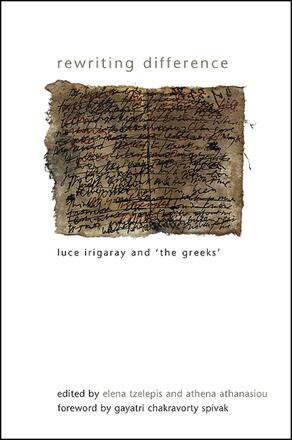
Rewriting Difference
Luce Irigaray and 'the Greeks'
Alternative formats available from:
A transdisciplinary reader on Luce Irigaray's reading and re-writing of Ancient Greek texts.
Description
In this definitive reader, prominent scholars reflect on how Luce Irigaray reads the classic discourse of Western metaphysics and also how she is read within and against this discourse. Her return to "the Greeks," through strategies of deconstructing, demythifying, reconstructing, and remythifying, is not a nostalgic return to the ideality of Hellenocentric antiquity, but rather an affirmatively critical revisiting of this ideality. Her persistent return and affective bond to ancient Greek logos, mythos, and tragedy sheds light on some of the most complex epistemological issues in contemporary theory, such as the workings of criticism, the language of politics and the politics of language, the possibility of social and symbolic transformation, the multiple mediations between metropolitan and postcolonial contexts of theory and practice, the question of the other, and the function of the feminine in Western metaphysics. With a foreword by Gayatri Chakravorty Spivak and a chapter by Irigaray responding to her commentators, this book is an essential text for those in social theory, comparative literature, or classics.
Elena Tzelepis is Lecturer in the Classics Department at Columbia University. Athena Athanasiou is Assistant Professor of Social Anthropology at Panteion University in Greece.
Reviews
"This is no doubt a state-of-the-art edited collection which will make a major contribution not merely to existing Irigaray scholarship and to the fields of feminism, gender and queer studies but, more widely, in contemporary critical and cultural theory. " — Year's Work in Critical and Cultural Theory
"The real strength, and rare quality, of this book lies in its willingness to engage in a nuanced—at times, even critical—approach to Irigaray's feminism. " — New Formations
"This singular volume begins to take account of the enormous influence and range of the work of Luce Irigaray. Taking as a point of departure the key critical writings on Greek philosophy that form the basis of Irigaray's theories of sexual difference, the sexed body, and writing, this anthology brings Irigaray's Greek legacy into the present to consider feminist philosophy as a critical rereading of philosophy's foundations. Here we see that the departures from that important tradition are as important as the debts we owe. Once again we see that to read Irigaray means learning to read in both directions at once. As well, we see in vivid terms that Irigaray's work poses an enormous challenge for rethinking relations of eros and love, recrafting philosophy through new textual and corporeal practices, both embodied and critical. The volume recognizes Irigaray as a feminist philosopher whose work has itself produced an impressive legacy of diverse and vital criticism among major contemporary thinkers. This is an invaluable text for those who wish to understand just how radically feminist thought intervenes in questions of history, love, embodiment, and critical readings in philosophy. " — Judith Butler, author of Frames of War: When Is Life Grievable?
"This book will captivate feminist scholars and classicists alike, presenting the complex panorama of an interdisciplinary study in which the primacy of the 'text' (be it Irigaray's or that of the ancient tradition) is at the same time confirmed and trespassed. " — Adriana Cavarero, author of Stately Bodies: Literature, Philosophy, and the Question of Gender